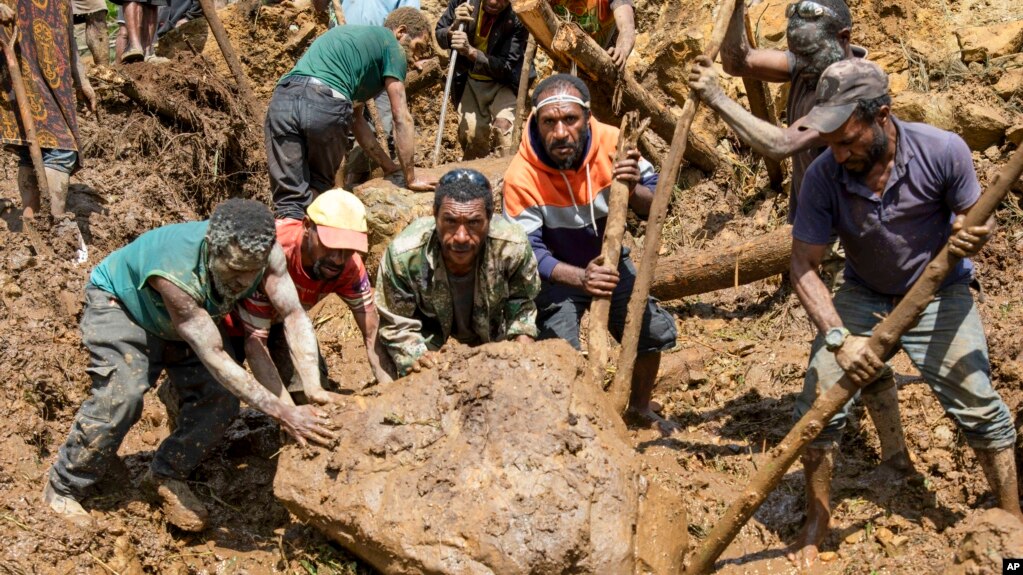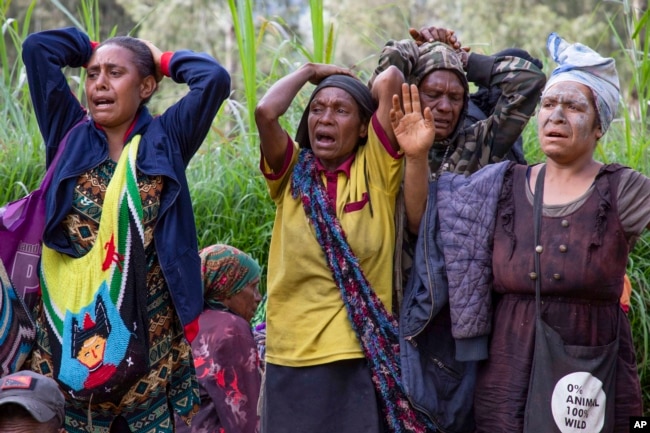AUDIO
Rescue Efforts in New Guinea Delayed by Dangerous Conditions

Officials in Papua New Guinea (PNG) have ordered people in parts of Enga Province to leave their homes because of the continuing danger of landslides.
The government estimates that the collapse of a mountainside buried at least 2,000 people on Friday. Officials said the likelihood of finding survivors is small. That number is higher than an earlier estimate from the United Nations, which placed possible deaths at 670.
An estimated 150 structures were buried in the landslide.
Rescue teams have been slow to arrive. Heavy rain and tribal unrest have delayed aid supplies and the heavy equipment needed to dig into the earth. The U.N. International Organization for Migration (IOM) said a bridge to the area had collapsed forcing aid vehicles to travel farther.
A military escort has guarded groups of rescue vehicles because of the unrest. A continuing deadly tribal conflict has made it more difficult for aid workers to get to the area.
Local people have used hand tools to search for survivors.

Sandis Tsaka is a provincial administrator and heads a disaster committee. He told Reuters that conditions remained dangerous. “The landslide area is very unstable,” he said, “…there are still rocks and debris coming down.”
Tsaka also said the military had set up security stops and is moving people to evacuation centers.
The U.N. said on Tuesday that six bodies had been recovered so far. The U.N. estimated the total number of those affected to be 7,849.
Nicholas Booth is a representative of the U.N. Development Program. He said the aid operation is very complex because the landslide area is increasing.
“It means that now, the area that’s been affected by the landslide is greater than it was at the beginning. We don’t know how it will develop, but that’s the nature of the geology in PNG.”
Booth also spoke about the tribal violence. He said eight people were killed and 30 houses burned in fighting on Saturday.
Itayi Viriri of the IOM spoke in Geneva. Viriri said aid teams need to be careful to prevent “another disaster,” saying “all response efforts have to be done in a very careful manner.”
On Tuesday, the U.N. said that immediate needs include clean water, food preparation tools, medicine, and psychological and social support.
A U.N. statement said provincial officials in New Guinea have asked the international community to send engineers to study geological dangers in the area.
Officials said the difference in the estimated number of dead is the result of the difficulty the country has in counting its population. The nation’s last credible population count, or census, was in 2000. A 2022 list of registered voters for the area does not include people under the age of 18.
Booth said estimates should be treated with “great caution.” He said, “It’s just not possible at this stage to make a very scientific, verified estimate.” Booth added, “But it’s going to be a very high number of casualties. We have to be prepared for that.”
______________________________________________
Words in This Story
escort –n. a group that accompanies and protects another group that is traveling
unstable –adj. in a condition that is likely to change and that is not solid or steady
debris –n. what is left behind after something has been destroyed
evacuation –n. an effort to move people out of an area for their safety
credible –adj. believable
caution –n. care and concern about something
casualties –n. (pl.) the number of injuries and deaths in a disaster
https://learningenglish.voanews.com/a/rescue-efforts-in-new-guinea-delayed-by-dangerous-conditions/7630041.html